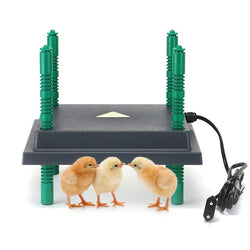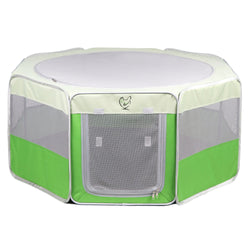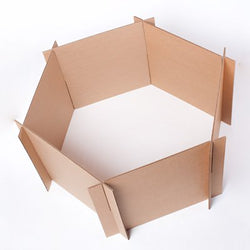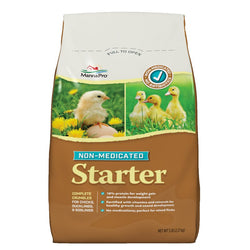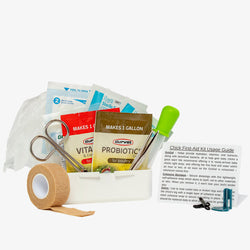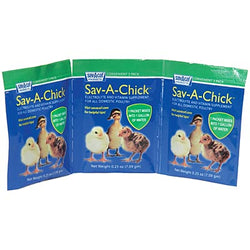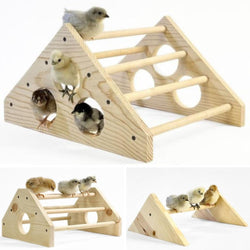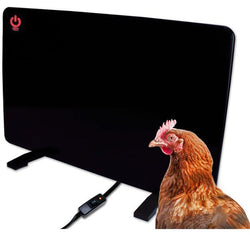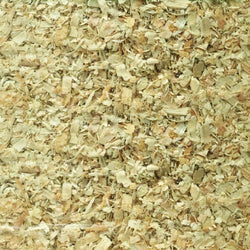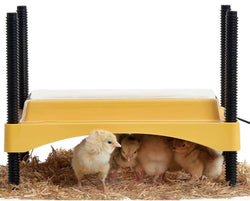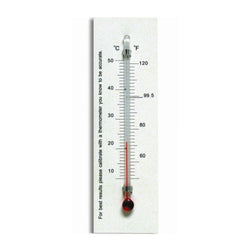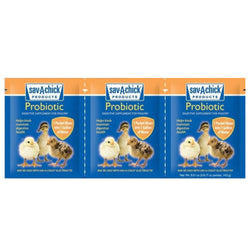My chickens run away whenever they see me. Can I tame them?
Back to blog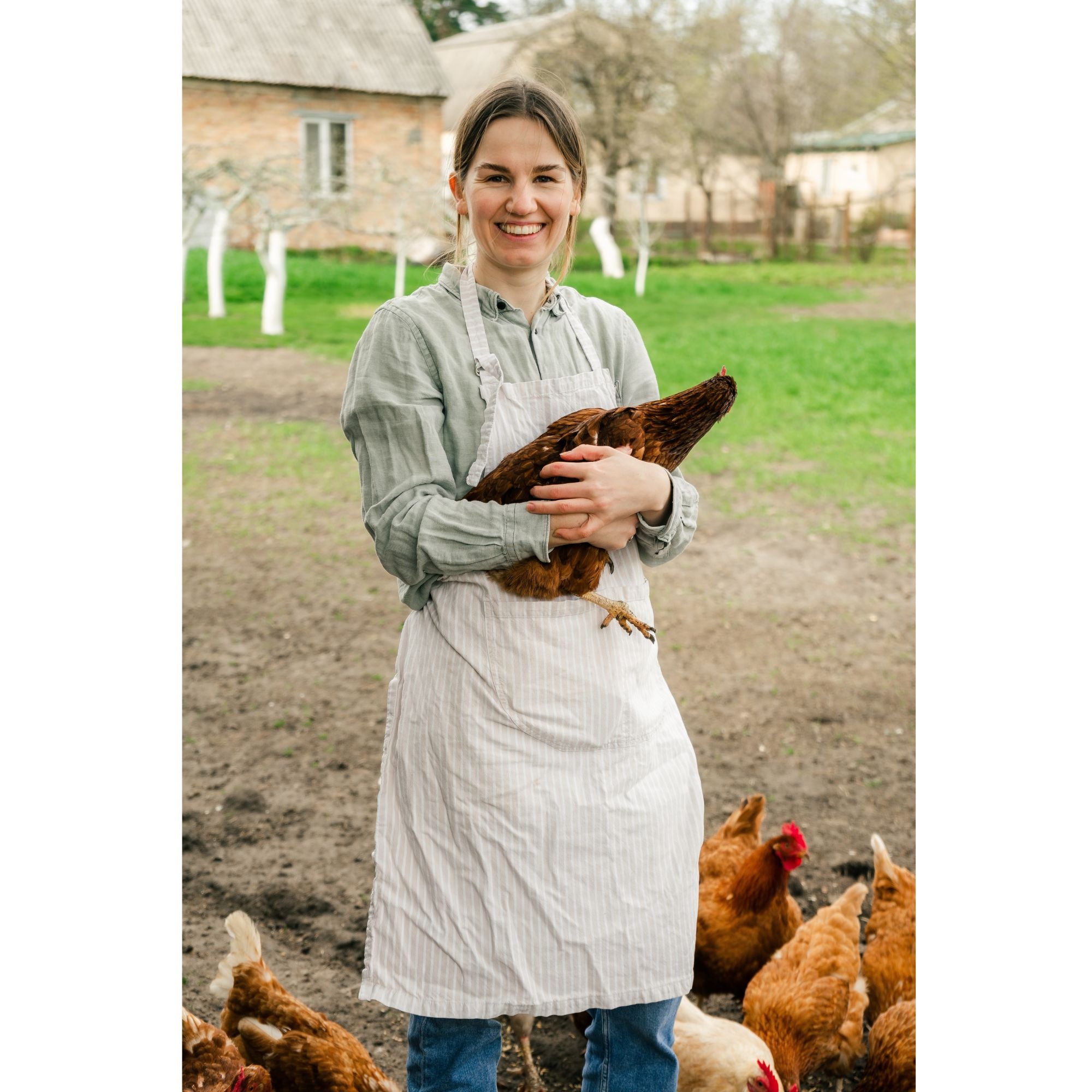
In general, chickens can be tamable and friendly by the same sorts of general methods you would use with a dog or a cat. Presuming they are healthy and receiving proper shelter, food and water--as well as nesting places--they will often be tempted by treats (given in moderation) of wild bird seed, meal worms, sunflower seed and so forth.
If they learn to associate you with good treats, they will probably come running to you when they hear you, rather than in the other direction.
Keep in mind that chickens do not usually like the same kind of handling a dog or a cat might like, although there are plenty of very tame chickens out there. (I have one who likes to ride around on my shoulder, and who adores belly rubs.) In addition, the breed of chicken (and even the personality of the individual chicken) will have a lot to do with whether or not they will be friendly to you. Chickens with large crests are often a bit flighty and startle easily because they cannot see very well. My Wheaten Ameraucanas are my friendliest chickens.
Treats are helpful, but it will take kindness, patience and effort to make any animal friendly to you, and chickens are no exception.
Here's a technique you can use when you begin with baby chicks to get them to eat from your hands. Sometimes they won't recognize what a treat is, at first, so you will have to start slow and be patient! It usually doesn't take long, though. What I like to do is identify a good-for-them treat like meal worms or oats, and spread a few on a paper towel or wooden board laid on the brooder floor until they begin to readily recognize the treats when I put them in. When that happens, I also put treats in my hand, and the boldest will come over and take the treats right from my palm! This is something you can help your kids do, too--there is nothing quite as magical as charming a bird!
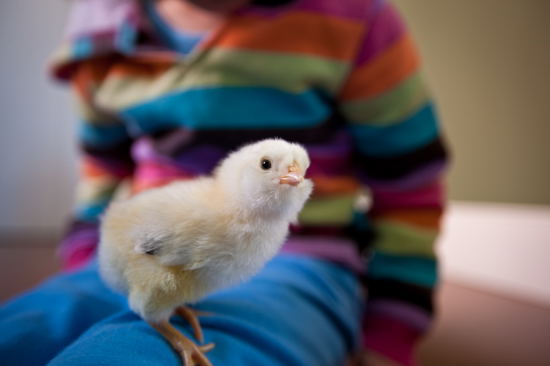
Eventually even the most shy will follow their sisters' lead. Once they begin eating from your hand, you can dispense with the board and just hand feed. Many chicks will even stand with their little twiggy chicken feet on your hand while they eat, just as before they were standing on the treat-covered paper towel or board: what fun! So long as your chicks stay warm and do not get stressed, gently handling them often will not hurt them, and will help to make them more tame when they get older. It can also help you teach young children how to be gentle and patient--it's just good all the way around.
A few important cautions: For your kids, make sure they wash their hands after handling baby chicks (remember, those chicks are walking and pecking around in poopy litter). For your baby chicks, make sure to provide grit for them when are eating treats, so they will be able to digest it properly. Chick starter is finely milled enough that no additional grit is needed when that is their sole diet.) Make sure, too, that the bulk of your baby chicks' diet comes from their starter, and that they are not getting so many treats that it upsets their nutritional balance.
If they learn to associate you with good treats, they will probably come running to you when they hear you, rather than in the other direction.
Keep in mind that chickens do not usually like the same kind of handling a dog or a cat might like, although there are plenty of very tame chickens out there. (I have one who likes to ride around on my shoulder, and who adores belly rubs.) In addition, the breed of chicken (and even the personality of the individual chicken) will have a lot to do with whether or not they will be friendly to you. Chickens with large crests are often a bit flighty and startle easily because they cannot see very well. My Wheaten Ameraucanas are my friendliest chickens.
Treats are helpful, but it will take kindness, patience and effort to make any animal friendly to you, and chickens are no exception.
Here's a technique you can use when you begin with baby chicks to get them to eat from your hands. Sometimes they won't recognize what a treat is, at first, so you will have to start slow and be patient! It usually doesn't take long, though. What I like to do is identify a good-for-them treat like meal worms or oats, and spread a few on a paper towel or wooden board laid on the brooder floor until they begin to readily recognize the treats when I put them in. When that happens, I also put treats in my hand, and the boldest will come over and take the treats right from my palm! This is something you can help your kids do, too--there is nothing quite as magical as charming a bird!

Eventually even the most shy will follow their sisters' lead. Once they begin eating from your hand, you can dispense with the board and just hand feed. Many chicks will even stand with their little twiggy chicken feet on your hand while they eat, just as before they were standing on the treat-covered paper towel or board: what fun! So long as your chicks stay warm and do not get stressed, gently handling them often will not hurt them, and will help to make them more tame when they get older. It can also help you teach young children how to be gentle and patient--it's just good all the way around.
A few important cautions: For your kids, make sure they wash their hands after handling baby chicks (remember, those chicks are walking and pecking around in poopy litter). For your baby chicks, make sure to provide grit for them when are eating treats, so they will be able to digest it properly. Chick starter is finely milled enough that no additional grit is needed when that is their sole diet.) Make sure, too, that the bulk of your baby chicks' diet comes from their starter, and that they are not getting so many treats that it upsets their nutritional balance.
